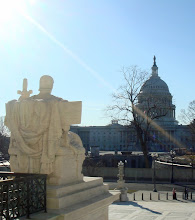Day 10: Corruption
In the latest Presidential debate, a seemlier affair than the first, allegations of corruption were lodged by each candidate against the other. What is corruption? For those schooled in Classical Liberalism, Aristotelianism provides a framework in considering this question and for helping us understand which candidates may be corrupt.
Of course, there are statutory prohibitions against potentially corrupt behavior, but with your indulgence, kind reader, I suggest we consider this topic on a deeper level.
In his “Nichomachean Ethics,” Aristotle wrote about three types of constitutions and how these are corrupted. He also wrote about the virtues of mankind, with excesses and deficiencies of a given virtue being a corruption of that virtue.
Let us focus today on the constitutions, as they provide a broad view, and how Mr. Trump and Mr. Biden stack up. I encourage you to review Aristotle’s virtues and to think how each candidate measures up in terms of the mean, deficiency or excess.
According to Aristotle, “Constitutions proper are kingly government and aristocracy; and, thirdly, there is a form of government based upon an assessment of property, which should strictly be called timocracy, though most people are wont to speak of it as constitutional government simply.” For our purposes, we may think of our American government as being in the third classification. Instead of property ownership, we use citizenship and age as requisites for engagement in the political process.
Assuming that we are still a constitutional government, Aristotle would say that corruption of such a form results in democracy – a majority rule form of government in which a simple majority decides for all. Take a moment to think of the implications of such a system, and the logical ends to which you will come will surely demonstrate the inherent dangers of pure democracy.
At the extreme, 51 percent of the population could decide to exterminate the other 49 percent. Yes, it is a reductio ad absurdum argument, so let me offer an example closer to home – the selection of a justice for a lifetime appointment to the Supreme Court. As discussed in Week 11, the Democrats in the Senate changed the voting threshold from a supermajority to a simple majority, yet they now bemoan the fact that Judge Coney-Barrett is being added to the Supreme Court without broader support. They made the simple majority bed, now they must sleep in it. Personally, I think a lifetime appointment to any office is significant enough to warrant a supermajority, but that’s just me.
Regrettably, our political history over the course of the past 100 years has been defined by the transfer of power from the people and local governments to the national government. Put another way, the hallmark of the past century is one of abdication of individual sovereignty. In effect, we have moved away from the timocracy or constitutional form of government to one more akin to a kingly form. Instead of one man as king, who so assumed his power by Divine Right, we have a kingly caste made up of lifelong politicians and deep state bureaucrats. Through this lens, there is little wonder that ascension to the presidency is more like a royal line of succession than a process of election by citizen voters. How else could Clinton, Biden or McCain have seriously been possible? They were entitled, and it was their time. Trump has been the anomaly. The only other anomaly in the recent past would be Ross Perot.
Aristotle describes the corruption of a kingly form of government as one in which the king (or in our case, the state) becomes a tyrant, placing his own interests above those of the people. In this context, we must consider the recent revelations of influence peddling by the Biden family. It is unlikely that we will have the full story of Mr. Biden’s son and brother and their profiting off of Mr. Biden’s name, his former position and the position to which he aspires. Be that as it may, the evidence out there already is damning and may easily be likened to values and practices of a tyrant. Mr. Trump, it is charged, has used his position to aggrandize his real estate fortune. It is certainly reasonable to assume that foreign powers and corporations hope to ingratiate themselves to the Trump family but patronizing Trump properties, but the accusation that seems to remain unanswered is whether or not the President has used his office to effectuate such patronage.
Which man’s “kingly” action is more corrupt? That is something each of us must decide before casting our ballot.
